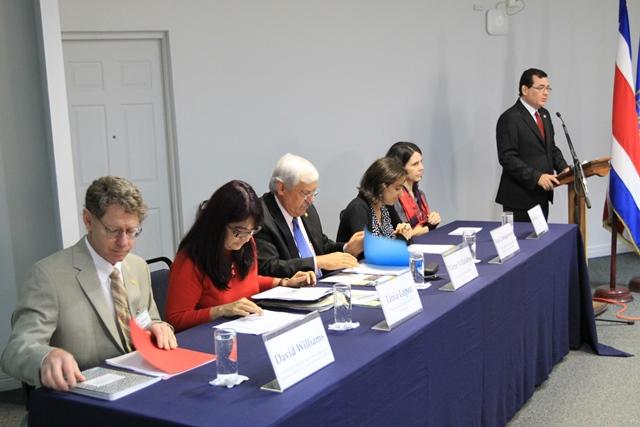Better together when building a climate change strategy for Latin America

Who suffers the most from extreme weather events? This is a difficult question, but German Watch recent climate risk index report serves a few answers. Here, they show that Latin America is a climate change hot spot as several of the region countries are at the top of the climate risk index!
Honduras and Nicaragua were among the top three countries most affected by extreme weather events between 1992 to 2011. El Salvador, Guatamala and Brazil all ranked very high on the parallel list covering countries severely hit by weather events in 2011.
Latin America also suffers from a paradox - despite being a great exporter of food, nearly 50 million people suffer from malnutrition. Gender inequality is also a worrisome topic. Despite overall economic- and social development in the region, men and women farmers still have unequal access to resources and opportunities.
The CGIAR Research Program on Climate Change, Agriculture and Food Security (CCAFS) has now started its work in Latin America, to contribute to these critical issues, in a similar way as it has done successfully in other regions such as East- and West Africa and South Asia.
Our work is expanding: Get to know our latest region - Latin America
CCAFS Latin America drew up an analysis that included interviews with different stakeholders within agriculture and climate change. This information was collected as input to develop the overall strategy for the region.
View the CCAFS Strategy Presentation for Latin America [in Spanish]:
Additional workshop presentations: Diagnostic, Strategy proposal and CATIE Presentation [in Spanish].
Both the analysis and the proposed strategy were presented in September at a workshop in Costa Rica, attended by representatives of the main organizations that are working on agriculture and climate change in the region.
The workshop was conducted with support from the Inter-American Institute for Cooperation on Agriculture (IICA) and the Tropical Agricultural Center for Research and Education (CATIE).

At the table: David Williams, IICA, Tania Lopez Lee, Dep. Minister of Agriculture of Costa Rica; Victor Villalobos, IICA Director General, Ana Maria Loboguerrero, CCAFS Regional Program Leader Latin america and Claudia Bouroncle. Photo: R. Cartín (IICA).
Tania Lopez, Deputy Minister of Agriculture of Costa Rica, said in her opening speech:
"Climate change, agriculture and food security are inseparable issues in the current context. To better understand this relationship and deal with the challenge of eradicating hunger, we must build better collaborations together."
When Victor Villalobos, Director General for IICA took the stage he emphasised:
"For IICA, the relationship with partners is very important, and we are pleased with the work that has been done by CGIAR and their results, for example, the implementation of the CCAFS research program in the region."
The Latin America strategy seeks to provide scientific evidence that will support the creation or improvement of policies, laws and programs that improve access to basic food to the most vulnerable people while contributing to low-emissions agricultural development.
The initiative has four main objectives, to be achieved by 2023:
- Reach six million farmers and help them change their agricultural practices to adapt to, and mitigate, climate change in a sustainable and socially appropriate way;
- Collaborate with institutions that support rural communities with information, advice and safety networks for food security. Create practices on adaptation to climate change for two million producers, through information services that are more relevant and effective;
- In at least four countries in Latin America, promote the application of low-emissions agriculture policies that will help in achieving a measurable reduction of greenhouse gases in the agriculture sector;
- Help eight countries in the region establish policy frameworks to address agriculture, climate change, food security issues and their relationships. This will be reflected in increased investment in agro-ecological practices and technologies.
Ana Maria Loboguerrero, Latin America Regional Program Leader, message to the participants was:
"We believe that the answers are here, we are in the region to help and to understand what the problems are, and what solutions we can bring forward. We want CCAFS be a key team-mate among the many farmer initiatives that have already been created."
The workshop ended with valuable insights from the attendees, who with their contributions helped enrich the program strategy. They added insights on how to get better results, dealing with the challenges of climate change and food security in the region. The hope is that the next phrase that will define Latin America is: "ready to address climate change."
Watch a video summary of the workshop [in Spanish]:
José Luis Urrea works as Communications Officer at the CGIAR Research Program on Climate Change, Agriculture and Food Security (CCAFS) Latin America office.
